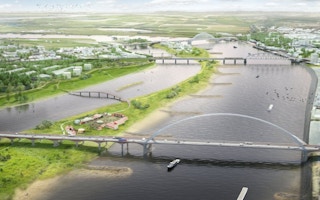Already, 70 per cent of megacities aligned with a global network say they are experiencing the effects of climate change, according to a new report.
Collectively, these urban areas have taken more than 9,800 individual climate actions since 2011, half of which are being conducted at the citywide scale.
The report, on megacities and climate change, was released by the C40 Climate Leadership Group just as the much-awaited UN climate summit began in Paris.
The heightened security situation in the city following recent terrorist attacks notwithstanding, some 40,000 attendees are expected for the two-week affair, including thousands of activists, hundreds of mayors and business leaders, and over 150 heads of state.
The climate talks, known as the 21st Conference of Parties or COP 21, are the first opportunity since 2009 for a global agreement brokered through the United Nations Framework Convention on Climate Change (UNFCCC).
Six years ago, talks broke down acrimoniously in Copenhagen before world leaders even arrived, an outcome that Paris organizers are hoping to head off by bringing heads of state and government into the room from day one.
Mayors and other local authorities are set to make a significant showing at Paris. For local officials from the 2,255 cities that have made official pledges to reduce emissions under the UNFCCC, the action heats up on 4 December.
“
If cities can work together to tackle climate change, nation states can too.
Eduardo Paes, mayor of Rio de Janeiro, Brazil and current C40 chair
On that day, Paris Mayor Anne Hidalgo and UN Special Envoy for Cities and Climate Change Michael Bloomberg will host the Climate Summit for Local Leaders at the Hôtel de Ville, Paris’ city hall. [See: Climate pledges from cities at record high ahead of Paris summit]
Bloomberg, the former mayor of New York, is the board president of the C40 Climate Leadership Group, a global network. On Monday, dozens of C40-aligned mayors released an Earth Statement calling on national leaders to commit to a series of climate actions. More cities are expected to sign onto the statement as COP 21 progresses.
The new report on megacities and climate change was prepared in collaboration with engineering firm ARUP. The report collates data from the 80 megacities in the C40 network to demonstrate how peer-to-peer learning has generated a robust, locally driven response to climate change.
“If cities can work together to tackle climate change, nation states can too,” Rio de Janeiro Mayor Eduardo Paes, the current C40 chair, said in the report’s foreword. The belief that cities have led the way on climate change while nations have dithered — such as at the Copenhagen talks in 2009 — undergirds much of the confidence by city leaders heading into COP 21.
“We’re in better shape going into Paris than we were going into Copenhagen, largely because of the progress cities have made, and C40 cities have helped lead the way,” Bloomberg said on the report’s release. [See: In Lyon, cities and regions commit to cutting 1.5 billion tonnes in emissions]
Cautious optimism?
Much of the efficacy toward future climate action will depend on financing. Some cities have shown that they can manage this on their own. The C40 group, for instance, has paid for 64 percent of its collective efforts to combat climate change through municipal budgets and cost savings, according to the new report.
In turn, COP 21 is expected to see a flurry of financial commitments. On Monday, Germany, Norway, Sweden and Switzerland announced a USD 500 million initiative alongside the World Bank to boost large-scale climate actions, among them support for low-carbon cities.
Such announcements are only the beginning of what will be necessary, however. Estimates for the global cost of keeping a warming planet below the 2 degree threshold range well into the trillions of dollars.
Although the global response to climate change remains heavily politicized, there appears to be a growing consensus that COP 21 could produce a historic, binding agreement between all 193 UN member states. The goal is an accord to cut carbon emissions such that the planet will not warm by more than 2 degrees Celsius, thus averting the worst impacts of natural disasters, global warming and rising sea levels.
“Never have the stakes been so high,” warned US President Barack Obama, while French President François Hollande declared, “The future of the planet is at stake.” UN Secretary-General Ban Ki-moon said, “The time for brinkmanship is over.”
Once world leaders have their say, diplomats will hunker down for marathon negotiating sessions in Le Bourget, a former airport turned convention center just outside the city limits. Meanwhile, Paris proper will be abuzz with climate activism from the grass roots to the city hall.
A planned major protest was canceled as the city remains under a state of emergency following the 13 November terrorist attacks on a stadium, theater and restaurants.
Nonetheless, over 500,000 marched in solidarity in cities worldwide over the past weekend, while 22,000 pairs of shoes marked the absence of protesters in the Place de la République, including pairs donate by UN Secretary-General Ban and Pope Francis. Wildcat protesters also held a demonstration despite the ban, leading to clashes with police.
This story is originally published here. Citiscope is a nonprofit news outlet that covers innovations in cities around the world. More at Citiscope.org.





















